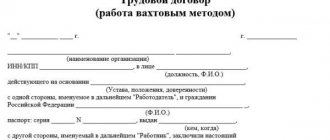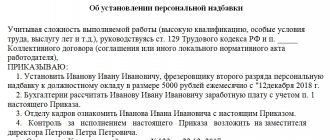16.09.2019
0
26
4 min.
The protection of citizens' labor rights affects all aspects of the relationship between the parties. Direct measures are prescribed in regulations, the main one of which remains the Labor Code. In particular, Article 60 of the Labor Code of the Russian Federation stipulates the possibility of assigning some additional work to an employee. The conditions under which this is permitted and the procedure for carrying out the procedure are indicated here. The position held, specialization and other factors are taken into account. The key requirement is voluntariness, confirmed by written consent. In its absence, management’s instructions are (legally) void, and their failure to comply does not entail consequences.
Legal provisions
The law, namely Article 60, establishes the combination of professions according to the Labor Code of the Russian Federation. The order and scope of what is permissible is indicated here. In particular, the main text prohibits requiring an employee to take actions not provided for in the employment agreement. Such an obligation occurs only in the form of exceptions related to force majeure, such as accidents, disasters and the elimination of their consequences.
Other provisions of this article allow the conclusion of agreements establishing part-time work. It means that the activity is carried out in the time free from performing main duties. External and internal part-time work is assumed, that is, an agreement with your own or a third-party employer.
The law also provides for combinations when activities take place during regular working hours. Usually it is facilitated by a similar profession or range of responsibilities. Without the written consent of a citizen, it is impossible to impose the corresponding functions on him. In turn, either party has the right to refuse to fulfill the conditions by notifying the other participant in advance. We are talking about a period of three days before the actual termination.
What is called freedom of labor?
It is important to know! The provisions stipulated by Article 60 of the Labor Code of the Russian Federation go back to the constitutional principle of freedom of labor.
In the Russian Basic Law they are prescribed by Art. 37. In fact, we are talking about a complete ban on forced work. This fact is a gross violation of human rights and entails consequences for the violator. In addition, the citizen is expected to have complete freedom in terms of choosing a profession and type of activity.
The term labor functions
Stopping the ban on violation of citizens' rights in terms of freedom from forced labor, legislation represented by Art. 57 of the Labor Code of the Russian Federation prescribes the concept of labor function. It is defined as the range of responsibilities enshrined in the contract. It specifies the employee’s activities by position or area. For example, the agreement may state that the person is a consultant. As an option, he is entrusted with the maintenance of electrical communications, which is also reflected in the contract.
Exceptions to the rules
The strict ban on involving a citizen in other activities (not specified in the agreement) has several exceptions. The change in function is prescribed in Art. 72 of the Labor Code of the Russian Federation, being entirely related to force majeure circumstances (accidents, disasters, epidemics) and the elimination of their consequences. This is the only situation that does not require human consent, but the period of its involvement is limited to one month. Payment is made for the work performed, but the amount cannot be lower than for the main activity.
Another comment to Art. 60.1 Labor Code of the Russian Federation
1. The constitutional principle of freedom of labor, which presupposes the right of everyone to freely dispose of their ability to work, choose their type of activity and profession (Article 37 of the Constitution of the Russian Federation), is manifested in the ability of a person to determine those organizational and legal forms in which he intends to realize his ability to work , as well as the possibility of their free combination. Work under civil law or labor contracts can be performed in favor of one person (customer, employer) or in favor of different persons. Part-time work occurs if the employee works under at least two employment contracts. Carrying out work under employment and civil law contracts, regardless of whether the customer (employer) is the same person or different persons, is not considered part-time work. Part-time work, by virtue of the commented article, is regular paid work carried out in accordance with an employment contract in free time from the main job.
2. Labor legislation of the period of real socialism limited combinations in every possible way. This limitation was carried out both in quantitative terms (by the number of employment contracts concluded as part-time workers), and by the subject composition and content of the labor function (by combined types of work and its quality).
The principle of freedom of labor proclaimed by the Constitution of the Russian Federation presupposes the free determination by a person realizing his ability to work, the circle of employers, the types and quality of work (qualification) performed within the framework of the relevant labor function. Restriction of freedom of labor in this area is carried out exclusively by law and only to the extent that it corresponds to general social interests (see Article 282 of the Labor Code and the commentary thereto).
Current labor legislation does not limit part-time work from the point of view of the circle of employers, distinguishing only between internal and external part-time work. Internal part-time work is regular paid work performed under an employment contract concluded with the same employer who is a party to the main employment contract. External part-time work is considered to be work under an employment contract concluded with another employer.
The main employment contract is the one that determines the employee’s place of work as the main one. From a formal legal point of view, it is at the main place of work that the employee’s work book is stored (this sign is important for determining the main place of work in case of external part-time work). A sign of part-time work: it is carried out during free time from the main job, i.e., as a rule, outside the normal working hours. These signs should be considered in interrelation, because each of them separately does not always matter. A situation is possible when an employee at the place of work where he has a work book works on a part-time basis (for example, four hours a week), and under a second employment contract is employed full-time. Under such conditions, the first of the named places of work will be considered the main one.
At present, there are no regulatory restrictions on the types and quality (qualification) of combined labor, i.e. according to the content of the labor function assigned to the employee for the main and combined work. In the same way, the number of working hours that can be performed by an employee on a part-time basis is not currently subject to regulation.
3. For the specifics of regulating the labor of persons working part-time, see Chapter. 44 Labor Code, art. Art. 276, 348.7 TC and comments to them.
Conditions allowing a change in labor function
There are several situations in which an employee’s job function changes. For example, this is a combination of professions under the Labor Code and other cases provided for by law. All of them require the consent of the person involved and financial motivation. This could be additional income or additional payment.
Part-time work
Part-time work is a form of additional employment for a person. It takes place during a temporary period free from performing primary duties. Registration should only be through an employment contract. It is concluded both with your employer, when this is considered an internal part-time job, and with a third-party company, then the form of employment is external. In any case, the employee is entitled to paid leave and other mandatory benefits.
Combination work
In the Labor Code, combining positions means that an employee during working hours performs activities in another profession or position. Usually these are related areas, for example, an electrician is also an equipment adjuster. An order is issued for the organization, which indicates the scope of responsibilities, the amount of work and the form of payment. The employee retains the right to refuse the combination at any time, but with notification to the employer 3 days in advance.
Expansion of job responsibilities
Article 60 of the Labor Code contains language related to an increase in the volume of work and service areas. In fact, here the speech is also related to the performance of duties in the main time, but in one’s profession. That is, there is simply an increase in activity. Written consent remains a prerequisite, and the employee has the right to refuse compliance at any time.
Temporary replacement
If for one reason or another an employee is absent (illness, business trip), his tasks can be temporarily assigned to a colleague. He performs them in parallel and together with the main activity at the same time. As in other cases, additional payment and written consent remain a prerequisite.
Article 60.1. Part-time work
Determination of the Supreme Court of the Russian Federation dated September 12, 2007 N 91-G07-22 During the development of these Conditions and procedures, the requirements of Art. Art. , 132, 60.1, 285, Labor Code of the Russian Federation on the prohibition of discrimination, equal opportunities for workers in exercising their rights; the dependence of wages on the qualifications of the employee, the complexity, quantity and quality of the work he performs, the rules of payment for part-time work and part-time or part-time work.
Determination of the Supreme Arbitration Court of the Russian Federation dated August 31, 2010 No. VAS-11792/10 in case No. A63-4964/2009-C6-22
The court of first instance, refusing to satisfy the society's demand, was guided by paragraph 1 of Article 9 of the Federal Law of July 16, 1999 N 165-FZ “On the Fundamentals of Compulsory Social Insurance”, paragraph 10 of the Regulations on the Social Insurance Fund of the Russian Federation, approved by the Decree of the Government of the Russian Federation dated 12.02 .1994 N 101, paragraph 1 of Article 15 of the Federal Law of December 29, 2006 N 255-FZ “On the provision of benefits for temporary disability, pregnancy and childbirth of citizens subject to compulsory social insurance”, Articles 60.1, paragraph 1 of Articles 259, 284 of the Labor Code of the Russian Federation, paragraph 6 of the Methodological Guidelines for conducting desk audits of policyholders for compulsory social insurance against accidents at work and occupational diseases, approved by Resolution of the Social Insurance Fund of the Russian Federation dated May 21, 2008 N 110.
Decision of the Supreme Court of the Russian Federation dated May 21, 2010 N GKPI10-182
Carrying out work for workers who are short-staffed is not the responsibility of the employee in the main position, but can be performed either as an internal part-time job in free time from the main job (Article 60.1 of the Labor Code of the Russian Federation), or in the order of combining professions without exemption from work specified in the employment contract (Article 60.2), i.e. outside the schedule and is compensated by appropriate payment (Articles 151, 285 of the Labor Code of the Russian Federation).
Cassation ruling of the Judicial Collegium for Administrative Cases of the Supreme Court of the Russian Federation dated December 14, 2018 N 34-КГ18-17
In accordance with Article 60.1 of the Labor Code of the Russian Federation, an employee has the right to enter into employment contracts to perform other regular paid work with the same employer (internal part-time job) and (or) with another employer (external part-time job) during his free time from his main job. Article 282 of the Labor Code of the Russian Federation stipulates that part-time work is the performance by an employee of other regular paid work under the terms of an employment contract in his free time from his main job. Part-time work can be performed by an employee both at the place of his main job and with other employers.
Ruling of the Supreme Court of the Russian Federation dated September 3, 2018 N 310-KG18-13071 in case N A83-6045/2017
Satisfying the stated requirement, the courts, having assessed the evidence presented in the case materials, guided by the provisions of Articles 162, 265, 269.2, 306.1, 306.4 of the Budget Code of the Russian Federation, Articles 60.1 (as amended on December 31, 2017, in force at the time of accrual and payment of remuneration for teaching work ), 276, 282 of the Labor Code of the Russian Federation, Resolution of the Ministry of Labor of Russia dated June 30, 2003 N “On the peculiarities of part-time work for teaching, medical, pharmaceutical workers and cultural workers”, Regulations on remuneration of employees of state budgetary and autonomous educational organizations of the Republic of Crimea, approved Resolution of the Council of Ministers of the Republic of Crimea dated December 30, 2014 N 658, proceeded from the lack of proof by the service that payments for additional work (combining professions, positions) made to the director of the institution led to an excess of the required payments or these payments were made without actually performing teaching work, due to with which, the violation of the public interest, the protection of which the order is aimed at, has not been confirmed.
Ruling of the Supreme Court of the Russian Federation dated November 26, 2018 N 310-KG18-18839 in case N A83-9998/2016
Recognizing the above provisions of the order as not corresponding to the current legislation, the courts were guided by Articles 60.1, 129, 135, 282, 284, 285 of the Labor Code of the Russian Federation, Federal Law of November 21, 2011 N 323-FZ “On the fundamentals of protecting the health of citizens in the Russian Federation”, Instructions on the organization of therapeutic nutrition in medical institutions, approved by order of the Ministry of Health of the Russian Federation dated 05.08.2003 N 330, regulatory legal acts of the Republic of Crimea, and proceeded from the absence of the actions of the ANII named after. THEM. Sechenov, misuse and ineffective use of budget funds, and other violations of budget legislation.







